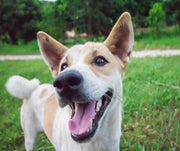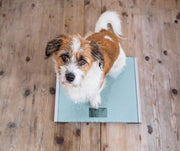Signs of Dog Anxiety & How To Relieve It

We have all felt it at one time or another in our lives. Anxiety affects roughly 18% of the population on a daily basis, but we have all suffered from some form of anxiety in some way. We often think of anxiety as a human condition, but animals can suffer from it too. Studies show that up to 70% of dogs experience some level of anxiety and certain breeds are more susceptible than others. Like with humans, there are signs you can look for.
Let's dive deeper into the signs of dog anxiety and ways you can help relieve it from your beloved pooch.
SEEKING SOLITUDE
As humans, we can sometimes desire a bit of alone time. The same notion is true with our furry friends. At times, your dog may walk into another room to lie down away from the family or crawl under the kitchen table where they feel a little more confined. This is perfectly natural for most dogs, but if your dog does this often, they could be experiencing anxiety.
RELIEF:
Take time to notice when you dog tends to go off on their own. Is there a particular time? Are there loud noises going on before your dog ventures away? Storms can cause this type of anxiety or even a rowdy family or child. Whatever has triggered your dog to seek solitude, try to find it and alleviate it if you can. Go to your pet and take a little time with them if they are seeking solitude too often.
DESIRING MORE AFFECTION
Often, an anxious dog will not seek solitude, but rather seek attention instead. Dogs can sometimes feel a sense of abandonment if their owners are not in the room or are outside without them. Even if they can see you and what you are doing, if they are not with you, they can still feel lost and experience anxiety.
RELIEF:
Dogs need people just as much as we need them. If you notice your dog feeling a little anxious every time you leave them, you might want to consider getting them a companion. Another dog of similar size can sometimes relieve their loneliness. If another dog is not an option for you, try leaving the TV or radio on when you leave home. The visual and audio stimulation is sometimes enough to curb possible anxiety.
DESTROYING THINGS

All dogs will chew something up at one point in their life. Generally, this behavior stops after the first year or two, depending on the breed. However, if destructive behavior goes beyond the first few years, there may be some anxiety lurking somewhere. Chewing on furniture, kids toys, shoes, and generally destroying things while you're away is not always a sign of a bad dog, but often one who is stressed of even bored.
RELIEF:

Ensure that your dog has plenty of appropriate items to chew on. Chewing helps dogs relax and is one of their natural instincts. Consider leaving your dog with a durable flavored Nylon bone from Pet Qwerks (pictured above). If your dog isn't much of a chewer, try a treat toy like the JW Tumble Teez. These types of toys stimulate your dog's mind and keeps them busy while you're away. Ensure the toys you purchase are safe and will stand up to your dog's chewing temperament. Ropes, balls, and specially designed nylon or rubber chew toys usually work best. Soft toys and plush style toys will be completely destroyed in a matter of minutes.
URINATION AND DEFECATION
Accidents happen with animals. Even trained dogs who generally go outside to do their business, can have an occasional accident. However, sometimes, these accidents have a hidden meaning. Dogs that defecate or urinate in specific areas, even though they are trained to go outside, may be experiencing anxiety.
RELIEF:
Again, this is an area in which the owner will have to analyze the situation and find out why their dog may be having accidents. Look at where and when your dog is doing its business. Is it on only your things? Is it in a specific place or at a specific time? What was going on in the home before the dog had its accident? Is there a medical issue? The answers to these questions can help you determine what triggered your dog's anxiety and subsequent accidents. Often, dogs will choose to urinate or defecate on your furniture or even your bed when they are anxious. Once you can pinpoint the triggers, you can work on ways to alleviate possible anxiety in the future and avoid having to clean up after the dog.
WAYS TO HELP YOUR DOG OVERCOME ANXIETY
Dogs experience anxiety on many different levels and in various ways just like humans do. The first thing you should do for your pet is determine what triggers their anxiety in the first place. This can be something simple like a loud noise in the home that may be new to the dog. No matter what it is, you need to find it and work with your dog in overcoming the issue. Reward your dog for good behavior and often, it will desensitize the dog to the stimuli.
If you have found the source of the anxiety, yet nothing is working to curb your dog's behavior, you can consult a professional. Dog trainers understand how dogs think and can often use specialized treatments to ensure anxiety is no longer a problem. The use of positive reinforcement might now work for you as their owner, but a dog trainer can sometimes help a dog change their behavior. An outside influence can sometimes help better than the dog's owners as there is no deep emotional attachment to the animal.
Once you have sought professional help, if the problem persists, it might be time to seek additional assistance through your vet. A vet is not merely available for the physical well being of your dog but can also prescribe anxiety medications. There are only recommended for the most extreme anxiety cases once all other avenues have been exhausted. Never give your pet any medication that is not specifically prescribed to them.
CONCLUSION
All in all, dogs can suffer from anxiety just like humans do. However, with a little time and patience, we can help our dogs relieve anxiety or stress. First, it's important to pinpoint what is causing anxiety in your dog. After you've figured that out, you can start making changes and working with your dog to help relieve anxiety. Remember to be patient and reward your dog for good behavior. Also, be sure to reassure your dog that's it's okay and you are there to protect them.
Previous article

Next article

Related posts
View all-

What Can You Use Instead of Cat Litter?
Traditional cat litter is convenient, but it’s not the only option. Many cat owners look for alternatives to reduce waste, save money, or avoid chemicals found in clay-based kitty litter. Some options offer better odor control, while others are more eco-friendly or gentler on a cat’s paws.
Read Article -

How to Keep My Backyard Smelling Fresh
A clean backyard should smell fresh, unlike pet waste, smoke, or mold. Bad smells can linger, especially when dog poop, urine, or food scraps attract flies and bacteria. If your yard has a foul odor, it's time to take action. The first step is cleaning up pet feces, trash, or rotting food. A garden hose can wash away dirt and urine from artificial turf, patios, and decks. To neutralize odor, Use baking soda, white vinegar, and essential oils.
Read Article -

What Supplies Do First-Time Cat Owners Need?
Bringing home a new cat is exciting, but making them feel safe and comfortable takes more than love. First-time cat owners must prepare with the right supplies to ensure a smooth transition. From a litter box to cat food and a warm bed, having the basics ready can help your new kitty settle in faster. This guide covers everything a new cat owner needs to make their new pet feel at home.
Read Article



